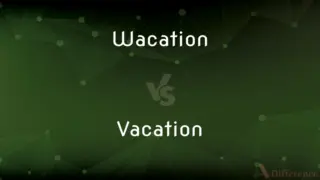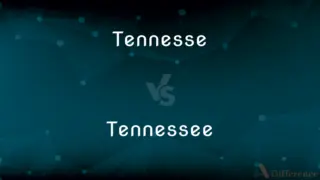Disect vs. Dissect — Which is Correct Spelling?
By Tayyaba Rehman — Updated on March 25, 2024
"Disect" is a misspelling; the correct spelling is "Dissect," meaning to cut apart for study.
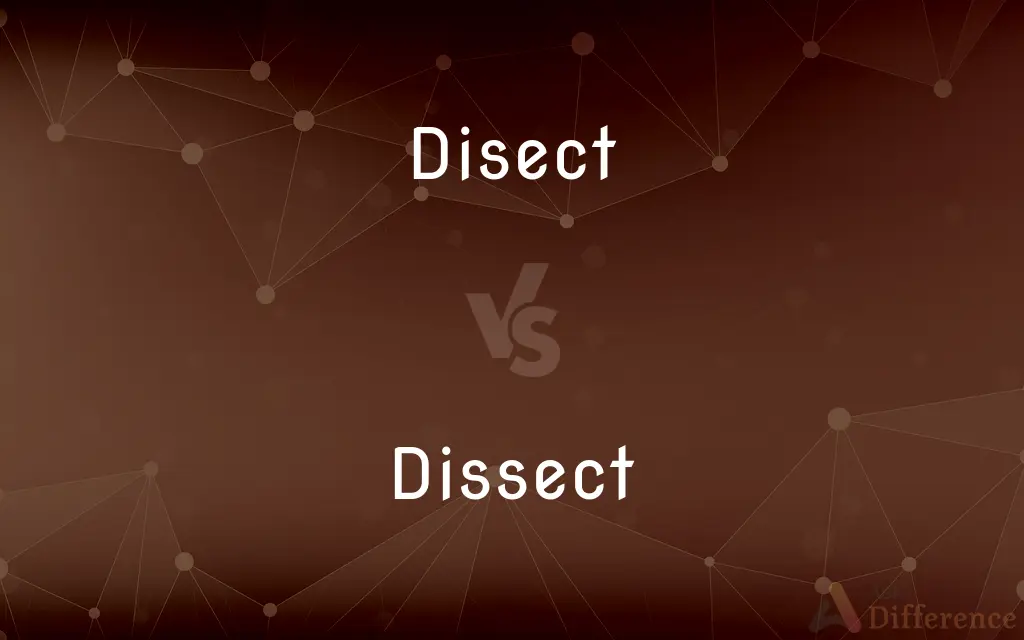
Table of Contents
Which is correct: Disect or Dissect
How to spell Dissect?

Disect
Incorrect Spelling

Dissect
Correct Spelling
ADVERTISEMENT
Key Differences
Envision scissors, which has two blades, just like "Dissect" has two S's.
Associate "Dissect" with "insect," which also has double S's and can be dissected for study.
Think of "Dissect" as "Di + sect", where "sect" implies sectioning something.
Note that "science" has two S's and so does "Dissect," often used in science.
Remember "Dissect" has two S's as in "Studying Specimens."
ADVERTISEMENT
How Do You Spell Dissect Correctly?
Incorrect: Can you disect this argument to find the main point?
Correct: Can you dissect this argument to find the main point?
Incorrect: We need to disect the article to understand its implications.
Correct: We need to dissect the article to understand its implications.
Incorrect: The surgeon will disect the affected area tomorrow.
Correct: The surgeon will dissect the affected area tomorrow.
Incorrect: He's skilled at using tools to disect electronic devices.
Correct: He's skilled at using tools to dissect electronic devices.
Dissect Definitions
To cut apart or separate tissue, especially for anatomical study.
Students dissected frogs in the biology class.
To divide into parts.
She dissected the argument to understand its premise.
To examine or analyze in detail.
Critics dissected the film for its underlying themes.
To cut open something, especially a dead body or a plant, to study its structure.
The pathologist dissected the organ to determine the cause of death.
To study closely or in detail.
The team dissected the report to extract the essential information.
To cut apart or separate (tissue), especially for anatomical study.
To examine, analyze, or criticize in minute detail
Dissected the plan afterward to learn why it had failed.
(transitive) To study an animal's anatomy by cutting it apart; to perform a necropsy or an autopsy.
(transitive) To study a plant or other organism's anatomy similarly.
(transitive) To analyze an idea in detail by separating it into its parts.
To separate muscles, organs, and so on without cutting into them or disrupting their architecture.
Of an infection or foreign material, following the fascia separating muscles or other organs.
To divide into separate parts; to cut in pieces; to separate and expose the parts of, as an animal or a plant, for examination and to show their structure and relations; to anatomize.
To analyze, for the purposes of science or criticism; to divide and examine minutely.
This paragraph . . . I have dissected for a sample.
Cut open or cut apart;
Dissect the bodies for analysis
Make a mathematical, chemical, or grammatical analysis of; break down into components or essential features;
Analyze a specimen
Analyze a sentence
Analyze a chemical compound
Dissect Meaning in a Sentence
We'll dissect the poem to uncover the hidden meanings behind its words.
In the debate club, they learned to dissect arguments effectively.
Biologists dissect plants to study their internal structures.
The committee will dissect the proposal to ensure it meets all requirements.
Scientists often dissect animal specimens to research diseases.
The editor will dissect the manuscript for any inconsistencies.
To understand how the engine works, we must dissect it part by part.
The teacher asked us to dissect a fish to observe its internal organs.
Dissect Idioms & Phrases
Dissect a situation
To examine or analyze a situation in detail.
The team met to dissect a situation that led to the project's delay.
Dissect the problem
To analyze a problem thoroughly by examining its parts.
Before finding a solution, it's important to dissect the problem and understand its root causes.
Dissect the market
To analyze the different segments and trends of the market.
Marketing professionals dissect the market to identify potential opportunities.
Dissect the data
To analyze data in detail to draw conclusions or insights.
Analysts dissect the data to predict future trends.
Dissect a theory
To examine and analyze a theory in detail.
In the philosophy class, students were asked to dissect a theory by a famous philosopher.
Dissect an argument
To analyze an argument by examining its components.
To effectively debate, one must learn how to dissect an argument.
Dissect the evidence
To thoroughly analyze evidence piece by piece.
The lawyer needed to dissect the evidence to build a strong case.
Dissect a process
To examine the steps or stages of a process in detail.
Managers dissect a process to identify inefficiencies.
Common Curiosities
Why is it called Dissect?
Dissect comes from the Latin word "dissecare" which means to cut apart.
Which vowel is used before Dissect?
There is no specific vowel that always precedes "dissect"; it depends on the context.
What is the verb form of Dissect?
The verb form is "dissect."
What is the singular form of Dissect?
The singular form is "dissect."
Which conjunction is used with Dissect?
No specific conjunction is exclusively used with "dissect"; it depends on the context.
What is the pronunciation of Dissect?
It is pronounced as /dɪˈsɛkt/.
What is the plural form of Dissect?
Verbs don't have plurals; however, its gerund form "dissecting" can be used in various contexts.
What is the root word of Dissect?
The root word is the Latin "dissecare."
Which article is used with Dissect?
The article "the" can be used with its noun form, as in "the dissect of the specimen."
Is Dissect an abstract noun?
No, "dissect" is not an abstract noun.
Is Dissect a vowel or consonant?
"Dissect" is a word, not a single letter. It contains both vowels and consonants.
Is the word Dissect imperative?
It can be used in the imperative mood, as in "Dissect the frog."
Which preposition is used with Dissect?
Commonly, "into" as in "dissect into parts."
Is Dissect an adverb?
No, "dissect" is not an adverb.
Is Dissect a negative or positive word?
"Dissect" is neutral; it isn't inherently negative or positive.
Is the Dissect term a metaphor?
Not in itself, but it can be used metaphorically, as in "dissecting an argument."
How many syllables are in Dissect?
There are two syllables in "dissect."
Is the word “Dissect” a Direct object or an Indirect object?
"Dissect" is a verb. It can have both direct and indirect objects, depending on the sentence.
What is another term for Dissect?
Another term is "anatomize."
What is the third form of Dissect?
The third form is also "dissected."
Is Dissect a countable noun?
"Dissect" is primarily a verb, so it's not countable.
What is the first form of Dissect?
The first form is "dissect."
Is Dissect a noun or adjective?
"Dissect" is primarily a verb.
Is Dissect a collective noun?
No, "dissect" is not a collective noun.
Is the word Dissect a gerund?
"Dissecting" is the gerund form of "dissect."
How do we divide Dissect into syllables?
Dis-sect.
What is a stressed syllable in Dissect?
The second syllable, "sect," is stressed.
What part of speech is Dissect?
"Dissect" is a verb.
What is the opposite of Dissect?
One opposite could be "assemble."
Which determiner is used with Dissect?
It depends on the context, but "the" and "a" can be used in certain sentences.
What is the second form of Dissect?
The second form is "dissected."
How is Dissect used in a sentence?
Example: "In biology class, we were required to dissect a frog to understand its internal anatomy."
Share Your Discovery
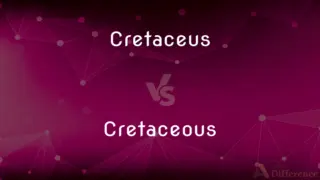
Previous Comparison
Cretaceus vs. Cretaceous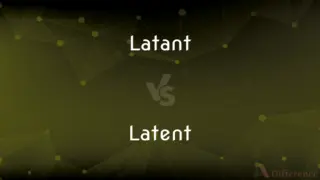
Next Comparison
Latant vs. LatentAuthor Spotlight
Written by
Tayyaba RehmanTayyaba Rehman is a distinguished writer, currently serving as a primary contributor to askdifference.com. As a researcher in semantics and etymology, Tayyaba's passion for the complexity of languages and their distinctions has found a perfect home on the platform. Tayyaba delves into the intricacies of language, distinguishing between commonly confused words and phrases, thereby providing clarity for readers worldwide.






























